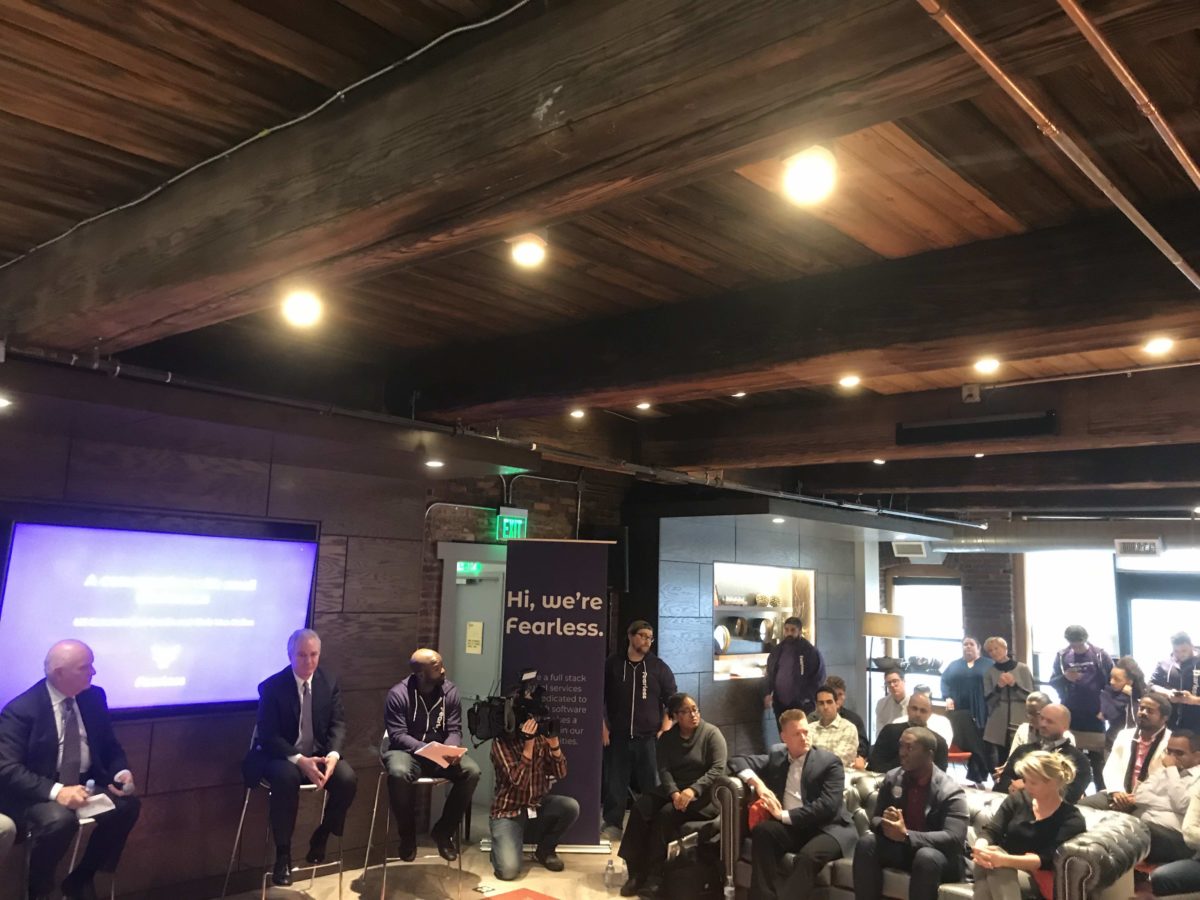As the federal government shutdown dragged on toward becoming the longest in history, Baltimore-based dev agency Fearless Solutions decided to write a letter to elected officials about the difficulties the impasse was causing up the road from D.C.
A week later, Maryland’s two U.S. Senators, Ben Cardin and Chris Van Hollen, were both at the company’s base in Spark Baltimore to listen to Fearless and other entrepreneurs discuss the impact of the shutdown.
“Every day that goes by, the damage around the country is growing. And it’s snowballing,” Van Hollen said of the 28-day partial government shutdown that affected nine federal agencies when funding lapsed as a result of the dispute over funding for President Donald Trump’s plan to build a wall on the country’s southern border.
In all, the shutdown has affected 800,000 government workers. In Maryland, 172,000 workers who are employed by the government or contractors are affected, according to estimates by the state comptroller’s office.
The economic effects also extend to small businesses, speakers on Thursday said. Cardin said small businesses were the “engine” of the economy. The business owners gathered showed how the shutdown affected growth.
For one, there’s the contractors who perform work for federal agencies that are currently closed. Companies like Fearless, which has contracts to provide digital tools to the U.S. Small Business Administration, among other agencies, are continuing the work, even as payment isn’t being sent. Those efforts also include subcontractors who have built up specific knowledge that would be lost if they couldn’t be paid, said Founder Delali Dzirasa.
Lisa Wolff, CEO of Columbia-based Next Phase Solutions and Services, said her Columbia-based company has done $3.5 million worth of work on contracts, including on weather data with NOAA.
“We are very team-oriented with our federal partners. They’re doing everything they can, but they can’t process payments,” she said. Along with the 125 employees at the company, the team works with eight subcontractors. “It is a ripple effect through the community,” she said.
Tina Williams-Koroma of Baltimore-based cybersecurity company TCecure said having even one contract affected can have an impact.
“Anytime you have billable hours that can’t get billed and start coming into overhead, a small business’ rates are a lot more sensitive than perhaps a larger business to relatively smaller fluctuations,” she said.
Programs run by federal agencies that provide loans and certifications that help businesses off the ground are also unable to do their work. As Cardin pointed out, they’re also piling up backlogs that will mean a slower process once the shutdown is over. Joey Price of Jumpstart:HR said he is looking to work with the federal government as a partner, but a certification process through the SBA is on hold. “It’s really been a hindrance to business development,” he said.
As chief credit officer and director of small business programs at the Latino Economic Development Center, Oswaldo Acosta was helping a new restaurant owner with a loan working with the U.S. Small Business Administration, but the process has stalled.
Larger businesses may be able to tap into diverse sources of money to keep going, but it’s different for the smaller businesses who make less. “The regressive effects of this shutdown will be felt most on low-income families,” he said.
Paul Reed Smith, owner of PRS Guitars in Stevensville, acknowledged he had a unique case. But it served as a reminder that there are plenty of unexpected consequences involving seemingly mundane tasks that go along with the shutdown. The business needs permits in order to export guitars due to regulations on the rosewood that makes up the instruments’ fretboards, but Smith can’t get the documents he needs.
“Half of my business is export, and I can’t get my permits from Fish and Wildlife because they’re shut down,” he said, adding that other guitar makers are facing the same issues. “It’s not just us, it’s the whole industry,” he said.
People expect stability from the federal government, Cardin said, and events like the shutdown can harm its reputation over time, as well. That goes for the employees and talent attraction efforts inside the government, as well. In building health IT and software to help modernize agencies, Agile Six Applications Chief Strategy Officer Dan Levenson said the company works to bring in top talent who who likely worked at private tech companies. The technologists and others take jobs working on public service for stability and the purpose behind the work, even if it pay less. With that stability jeopardized, they may be less likely to make the tradeoff, he said.
“I think it has of course the immediate impact, but there are longer term repercussions as we’re all working to improve government,” he said.
Join our growing Slack community
Join 5,000 tech professionals and entrepreneurs in our community Slack today!
Donate to the Journalism Fund
Your support powers our independent journalism. Unlike most business-media outlets, we don’t have a paywall. Instead, we count on your personal and organizational contributions.

Maryland firms score $5M to manufacture everything from soup to nanofiber

National AI safety group and CHIPS for America at risk with latest Trump administration firings

How women can succeed in male-dominated trades like robotics, according to one worker who’s done it


